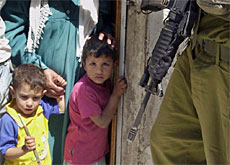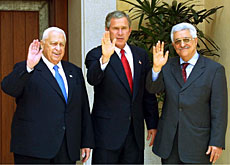ICRC calls for protection of Palestinian civilians

The International Committee of the Red Cross (ICRC) has called on the Israeli government to do more to protect the Palestinian population in the Occupied Territories.
The Geneva-based organisation blames Israel’s security crackdown for plunging the majority of Palestinians into economic hardship.
“We know full well that Israel has very legitimate security concerns… but more needs to be done to ensure that these security measures do not affect the entire Palestinian population,” Patrick Vial, the head of Middle East Operations for the ICRC, told swissinfo.
The worsening humanitarian situation in the region has prompted the ICRC to extend its emergency relief programme in the West Bank.
But the ICRC said humanitarian assistance should not be seen as an alternative to Israeli obligations towards the Palestinian population.
Ongoing violence
The agency has also appealed to both sides to work harder to prevent civilian casualties, following the recent escalation in violence between Israelis and Palestinians.
“The ICRC calls for the protection of all civilians in such situations of violence and urges that they be spared in all circumstances,” the organisation said in a statement.
It said Israel, as the occupying power in the West Bank and Gaza Strip, had a duty to protect the Palestinian people in accordance with the Geneva Conventions.
The Geneva Conventions, which form the backbone of international humanitarian law, also stipulate that “the population living under occupation must be allowed to have access to all the basic needs of daily life.”
“On the Palestinian side, Israeli military operations throughout the West Bank and Gaza Strip have provoked many deaths and injuries… many women and children among them,” stated the organisation.
Suffocating measures
According to the ICRC, Israel’s military crackdown – in response to Palestinian terror attacks – is suffocating the local economy, leading to poverty and severe unemployment.
“More efforts should be taken to facilitate the circulation of goods and people,” said Patrick Vial.
Last year the organisation began providing emergency relief to around 300,000 of the poorest people in both urban and rural areas in the Palestinian Territories, including food and housing assistance.
The programme was originally scheduled to end in June, but the ongoing violence and Israel’s continued policy of sealing off Palestinian areas have forced the ICRC to prolong its aid relief until the end of 2003.
“Unfortunately, the restriction of movement in the Territories has been maintained by the Israeli authorities, despite repeated calls by the ICRC to adapt the measures,” said Vial.
“The Israeli authorities are conscious that such a situation cannot last forever and we are hopeful that the ICRC’s request will be positively considered,” he told swissinfo.
Road Map
The ICRC also hopes that the latest Middle East peace plan, known as the “Road Map for Peace”, will result in an improvement in the humanitarian situation in the region.
But despite the talk of peace, Vial says he has not seen any significant changes on the ground so far.
“Hopefully the dialogue will continue between the parties… There is still a chance we will see an improvement,” Vial said.
“But regardless of political developments, the obligations of an occupying power remain the same,” he added.
swissinfo, Anna Nelson in Geneva
The ICRC has decided to extend its relief programme in the Occupied Territories until the end of 2003.
The aid organisation cited ongoing violence and Israel’s strict security policy in the West Bank and Gaza Strip as the reasons behind the extension, which will cost over $8.6 million (SFr11.23 million).
According to the ICRC, 60 per cent of Palestinian families in urban areas and 70 per cent in the countryside fall below the World Bank poverty line.
As the occupying power in the West Bank and Gaza Strip, the ICRC says Israel has a duty to ensure that the basic needs of the civilian population are met.

In compliance with the JTI standards
More: SWI swissinfo.ch certified by the Journalism Trust Initiative

You can find an overview of ongoing debates with our journalists here. Please join us!
If you want to start a conversation about a topic raised in this article or want to report factual errors, email us at english@swissinfo.ch.